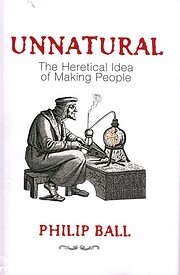

Fai clic su di un'immagine per andare a Google Ricerca Libri.
|
Sto caricando le informazioni... Non è naturale: creazione e procreazione tra mito e scienza (2011)di Philip Ball
 Nessuno Sto caricando le informazioni...
Iscriviti per consentire a LibraryThing di scoprire se ti piacerà questo libro. Attualmente non vi sono conversazioni su questo libro.   ) )nessuna recensione | aggiungi una recensione
* Can we make a human being? * That question has been asked for many centuries, and has produced recipes ranging from the homunculus of the medieval alchemists and the clay golem of Jewish legend to Frankenstein's monster and the mass-produced test-tube babies in Brave New World. * All of these efforts to create artificial people are more or less fanciful, but they have taken deep root in Western culture. They all express fears about the allegedly treacherous, Faustian nature of technology, and they all question whether any artificially created person can be truly human. Legends of people-making are tainted by suspicions of impiety and hubris, and they are regarded as the ultimate 'unnatural' act - a moral judgement that has its origins in religious thought. * In this fascinating and highly topical study, Philip Ball delves beneath the surface of the cultural history of 'anthropoeia' - the creation of artificial people - to explore what it tells us about our views on life, humanity, creativity and technology, and the soul. From the legendary inventor Daedalus to Goethe's tragic Faust, from the automata-making magicians of E.T.A Hoffmann to Mary Shelley's Victor Frankenstein - the old tales and myths are alive and well, subtly manipulating the current debates about assisted conception, embryo research and human cloning, which have at last made the fantasy of 'making people' into some kind of reality. Non sono state trovate descrizioni di biblioteche |
Discussioni correntiNessunoCopertine popolari
 Google Books — Sto caricando le informazioni... Google Books — Sto caricando le informazioni...GeneriSistema Decimale Melvil (DDC)570.1Natural sciences and mathematics Life Sciences, Biology Life Sciences Theory And InstructionClassificazione LCVotoMedia: (3.71) (3.71)
Sei tu?Diventa un autore di LibraryThing. |
||||||||||||||||||||||||||||||||||||||||||||||||||||||||||||||||||||||||||||||||||||||||||||||||||||||||||||||||||||||||